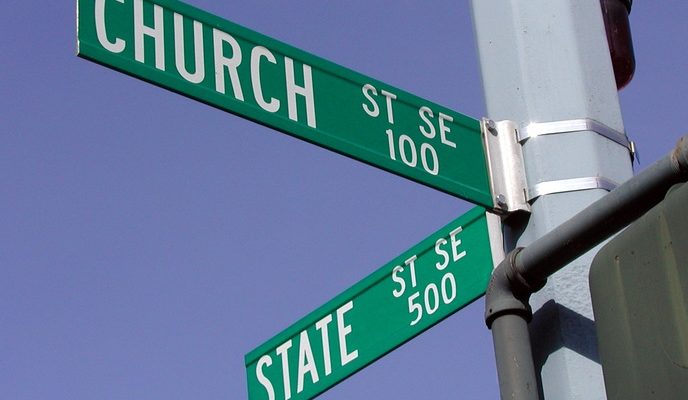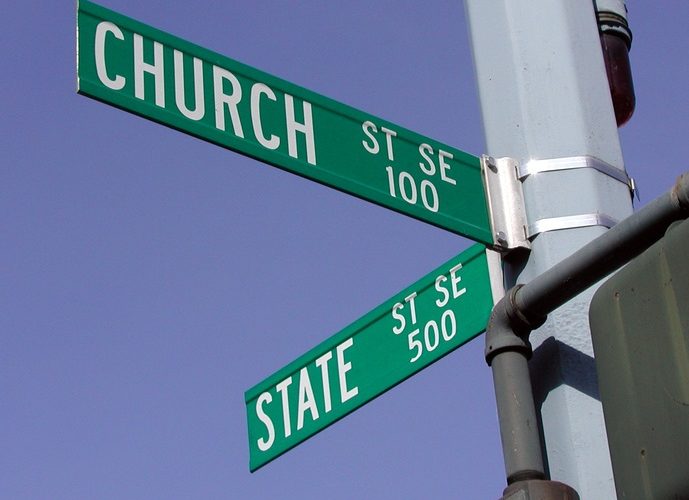As a new administration comes to Washington, a fundamental restatement of church-state separation should become a top priority, according to officials with Americans United for Separation of Church and State.
“The Trump administration’s misuse of religious freedom to harm others was unprecedented,” said Rachel Laser, CEO and president of Americans United. “During the last four years, the Trump administration corrupted the concept of religious freedom, using it to sanction discrimination, deny access to health care and require taxpayers to fund religion.”
Indeed, the very definition of “religious liberty” has been a touchstone of the differences between religious conservatives and others. The predominant Christian conservative view is that religious liberty should protect their own free exercise of religion, even if that impedes the free exercise of religion by others or violates the “no establishment” clause of the First Amendment. Underlying this view is a belief that America is a “Christian nation” and therefore ought to favor Christian viewpoints.
The very definition of “religious liberty” has been a touchstone of the differences between religious conservatives and others.
The AU document declares: “Religious freedom means that everyone should be able to practice their religion or no religion at all — without government interference, preference, or disfavor — so long as they don’t harm others. This do-no-harm principle, enshrined in the Establishment Clause of the First Amendment, ensures that religious freedom is a shield that protects the rights of everyone to practice their faith or not to practice any faith at all, and not a sword to harm others or to discriminate.”
AU called on the incoming Biden-Harris administration to “right the wrongs of the Trump administration and build a better future — one that values religious freedom and equality for all.”
To that end, the advocacy group offered its list of 10 things that must be done:
First, repeal the so-called “Muslim ban.” This was the Trump administration’s much-contested exclusion of immigrants from certain Muslim-majority countries. Although early versions of these bans did not survive legal scrutiny, the U.S. Supreme Court in 2018 allowed a third iteration to stand.
“No one should be banned from our country because of their religious beliefs,” the AU plan says. “Because of Trump’s Muslim and African bans, countless families have been separated, people have been denied access to lifesaving medical treatments, talented students and researchers have been denied permission to study here, and even in the midst of a pandemic when first responders are overwhelmed, doctors and medical professionals who could help care for patients have been prohibited from entering the country. These bans are morally wrong and betray our national values.”
Biden already has signaled that he intends to repeal the Muslim ban on his first day in office.
Second, sign an executive order “to restore and protect religious freedom for all Americans.” This suggestion would create a ripple effect throughout government agencies that have been guided by the Trumpian philosophy.
Such an executive order, if it restates historic and fundamental principles of religious liberty, would change the direction of government agencies, the statement says.
“The agencies must follow the order and rescind existing policies, regulations, guidance, memoranda and opinions that wrongly assert that religious freedom can be used to undermine nondiscrimination laws and access to health care. The executive order and its principles will also guide agencies as they adopt new policies to right the wrongs of the Trump administration.”
Among those policies are several Department of Justice memoranda and opinions that have sought to reinterpret the definition of religious liberty toward a conservative Christian agenda.
Third, protect religious freedom of all who use government-funded social services. AU has in mind here specific situations in nine government agencies: Agriculture, Education, Health and Human Services, Homeland Security, Housing and Urban Development, Justice, Labor, USAID, and Veterans Affairs.
An example would be policies about adoption and foster care services that are denied to individuals who don’t meet the religious criteria of agencies that receive government funding but want to be selective in whom they serve. Another example would be government-funded programs, such as services to the homeless or hungry, that require participation in religious exercises.
“When the government funds faith-based organizations to deliver social services … it must protect peoples’ religious freedom.”
“When the government funds faith-based organizations to deliver social services — such as food banks, homeless shelters, job training, and elder care — it must protect peoples’ religious freedom and ensure that they can get the services they need,” the AU report says.
Fourth, protect federally funded employees from religious discrimination. In some cases, organizations that receive federal funding also practice intentional discrimination in their hiring, such as a Catholic social service agency only hiring Catholics. AU’s position is that if an agency receives federal money to do their work, that agency should be required to consider all job applicants equally and without discrimination.
“Effective government partnership with faith-based groups … does not require the sanctioning of federally funded religious discrimination,” the outline says. “The government should never fund discrimination, and no one should be disqualified from a taxpayer-funded job funded because they are the ‘wrong’ religion.”
The Trump administration has loosened previous policies to allow more acceptance of exclusionary practices, and these could be undone by a series of executive order by Biden.
Fifth, ensure Americas are not denied health care “based on someone else’s religion.” Here, the Trump administration has turned policies that previously protected those seeking health care from discrimination to instead protect care providers who want to deny services to others because of their own religious convictions. For example, a pharmacist who doesn’t believe in birth control would not be required to dispense birth control medication. Or a physician who opposes transgender identity would not be required to treat a transgender patient.
Specifically, the Trump administration put forth a Denial of Care Rule that embodies this philosophy of protecting the deeply held religious beliefs of care providers over access to care for everyone equally.
“No one’s access to health care should be blocked by someone else’s religious beliefs.”
“No one’s access to health care should be blocked by someone else’s religious beliefs,” the AU statement asserts.
Sixth, support the “Do No Harm Act.” This bill, sponsored by Vice President-elect Harris in the Senate, aims to restore the Religious Freedom Restoration Act to its original intent. RFRA is a landmark piece of legislation that sought to protect minority religious groups’ constitutional right to freely exercise religious beliefs. RFRA prohibits the federal government from placing a “substantial burden” on a person’s religious exercise unless doing so is the least restrictive means of furthering a compelling governmental interest.
The Do No Harm Act, according to its advocates, would clarify that RFRA was intended to protect religious freedom without allowing the infliction of harm on other people. It would do this by amending RFRA to specifically exempt areas of law where the bill has been used to bypass federal protections.
Seventh, fund public schools and not private schools with public funds. This has been a major battleground advanced heavily by the Trump administration and specifically Secretary of Education Betsy DeVos. She has championed government-funded vouchers for private schools, including sectarian schools, as well as investment in charter schools that often face less accountability than public schools and may also have religious agendas.
Although funding for public schools is not purely a church-state issue, the Trump administration’s advocacy for faith-based schools has made it more so.
Although funding for public schools is not purely a church-state issue, the Trump administration’s advocacy for faith-based schools has made it more so.
“Voucher schemes, historically rooted in efforts to evade desegregation orders after Brown v. Board of Education, still further discrimination,” the AU report says. “Furthermore, school vouchers, which primarily fund religious schools, violate fundamental principles of religious freedom, including that no taxpayer should be forced to fund the religious education of others.”
Eighth, protect and enforce the Johnson Amendment. This provision in the tax code prohibits tax-exempt religious entities from endorsing or opposing political candidates. Trump has openly flaunted this law and even claimed he “got rid” of it, which is not true. However, enforcement of this legal requirement has been lax.
Trump and members of his administration “have encouraged and even participated in campaign events that clearly violated the law,” the AU says.
Ninth, ensure that government reflects the nation’s religious diversity. AU claims the Trump administration has “surrounded itself with only members of one particular segment of a single faith — conservative evangelical Protestants — and has elevated their opinions and political interests above all others.”
In contrast, the Biden administration “should build an administration that mirrors the religious diversity of our nation and maintains an expertise in church-state separation,” AU says, by hiring a religiously diverse staff, seeking the opinions of people of all faiths and working with partners from all faiths.
Finally, nominate federal judges who respect the separation of church and state. One of the enduring legacies of the Trump administration — empowered by Senate leader Mitch McConnell — has been the appointment of 220 federal judges in the past four years. AU charges that many of those new judges do not have a proper understanding of church-state issues.
This rapid advance of appointments was made possible, in part, because McConnell had stymied action on federal judge nominees from the Obama administration and then fast-tracked Trump’s nominations.
Whether a Biden administration will be able to make gains on this recommendation depends on the outcome of Georgia’s two Senate runoff races in January, which will determine whether McConnell continues to have the power to block judicial appointments by a Democratic president.
Related articles:
Religious-liberty watchdog groups concerned by Trump’s promise to expand school prayer
Separation of church and state? (yes, sort of) | Bill Leonard
Barrett joins in debate as Supreme Court weighs Philadelphia religious liberty case


